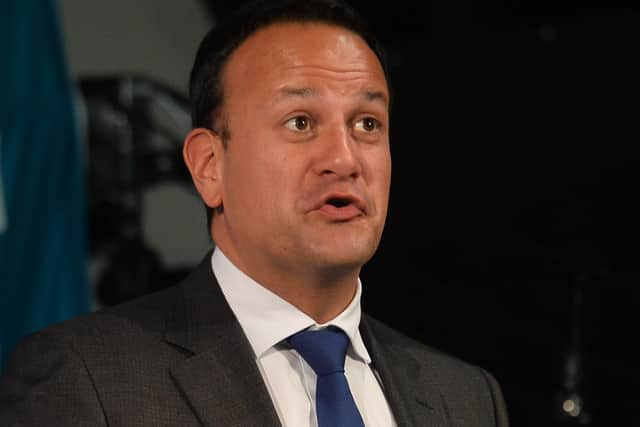Alex Kane: Unionism should be ready to think the unthinkable


King George V addressed the opening session: “I inaugurate it with deep-felt hope, and I feel assured that you will do your utmost to make it an instrument of happiness and good government for all parts of the community which you represent ... May this historic gathering be the prelude of a day in which the Irish people, North and South, under one Parliament or two, as those Parliaments may themselves decide, shall work together in common love for Ireland upon the sure foundations of mutual justice and respect.”
But, to paraphrase L P Hartley, that past was a foreign country where things were different and done differently. Unionists no longer have a majority in the house on the hill; that was lost in March 2017 and seems unlikely to return anytime soon. Unionists no longer have a majority in Belfast City Hall. Unionists no longer have a majority of MEPs (although that’s not really going to matter all that much after January 31). Unionists no longer return a majority of MPs to Westminster. Demographics, specifically in terms of unionist versus nationalist votes, are narrowing (although the 18% of ‘others’ means that both of the traditional sides need to find a way of broadening their appeal), and the fallout from Brexit has pushed the Irish unity debate into the spotlight (although, as I’ve noted before, a victory for Remain wouldn’t have lessened the demand for unity from nationalist parties).
Advertisement
Hide AdAdvertisement
Hide AdUnionists do not need to be afraid of the shifting electoral, demographic and political dynamics. But they do need to be aware of them and capable of a coherent response. They need to take very careful stock of where they are right now, where they want to be on June 7, 2021 and where they plan to be in 20, 30 or even 50 years time.


To listen to Sinn Fein representatives on both sides of the border you could be forgiven for assuming that they had unity in the bag. They don’t: and that’s why they’re increasingly cross with Leo Varadkar, Micheál Martin and even Eamon Ryan (leader of Ireland’s Green Party), for dismissing the idea of a border poll anytime soon as divisive and counterproductive.
A few months after the Brexit referendum in June 2016 one could almost feel the ‘A Nation Once Again’ fever sweeping through Sinn Fein. They thought all their Christmases had come at once, allowing them to play the ‘England’s misfortune is Ireland’s opportunity’ card to maximum effect. Yet their rhetoric and excitement meant and continue to mean nothing in the absence of support from the political establishment in the South: and unless Sinn Fein lands a whopping electoral blow in the next Irish election – due fairly soon – then it looks like that establishment will continue to hold back on the idea of a border poll.
Which is understandable, of course. Having seen what happened across the UK after Brexit I think any Irish government would be reluctant to push for a poll that would certainly be hugely divisive in Northern Ireland and potentially very divisive in the South, too. A couple of months ago a very senior TD told me: “The last thing we need right now is having to deal with hundreds of thousands of pissed-off unionists on the losing side of a border poll. Sinn Fein has one goal and one goal only, but it’s very unlikely that Sinn Fein would be able to control all of the consequences if they achieved that goal. They haven’t convinced a majority in the North to back them. They’re nowhere close to convincing a majority down here.”
Advertisement
Hide AdAdvertisement
Hide AdNone of this means that Irish unity won’t happen: only a fool would think that. But it does mean that very considerable thought is being given to it. An absolutely terrible Brexit post-January 31 could shift the 18% of ‘others’, along with small-n nationalists and small-u unionists towards unity. But we’re not at that point and may never be.
A full-scale debate on the issue of unity (which is what Sinn Fein says it wants) may raise problems which cannot be resolved. A border poll could result in a narrow win for unionism and seven more years of political instability. A ‘good’ Brexit could actually increase support for the Union. In other words, there are no certainties.
Which is why I think unionism needs to be doing more serious thinking than it has done for decades. It isn’t surrender or ‘latter-day Lundyism’ to talk about the possibility of Irish unity even when, as I do, you think it’s unlikely to happen anytime soon. It isn’t a sign of weakness to acknowledge and address potential realities. It isn’t some sort of sell-out to consider any and every option for the future. But it is downright stupid to bury your head in the sand after dismissing worrying evidence. It is monumentally ridiculous to imagine that there is ‘nothing to fear but fear itself’. And it is thunderingly irresponsible to heap mantra upon mantra while digging a deeper hole.
I spend a lot of time talking to unionists and loyalists across the pro-Union political community, as well as those within the broader business, professional, civic and what I’ll call – with no disrespect intended – ordinary, everyday unionist classes. They have an assortment of worries; one of which is a sense that the world is against them. But the most common worry, across all communities and classes, is that the leadership of unionism always seems to be on the back foot. That’s the priority concern for them. And that’s the issue they want addressed.
And, on that point, let me wish all of you a happy new year. Thanks for continuing to read the column. I hope 2020 will be kind to all of us.